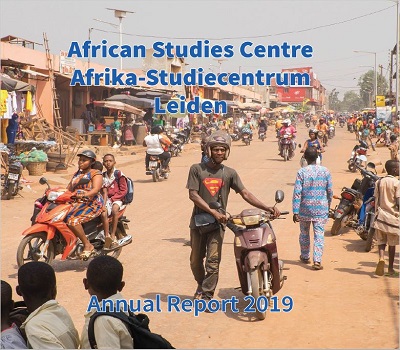New publications
New publications by ASCL staff and affiliates, and new books in our series, are frequently highlighted on this website. You may also use this RSS feed to keep informed. All recently added publications can be found in our database.
 The Annual Report for 2019 is out now! In addition to an excellent list of publications by our researchers, you will find other highlights such as the well-visited conference 'The Future of the African City', the start of the Graduate Programme in African Studies, and the Stephen Ellis Annual Lecture by Emmanuel Akyeampong, Ellen Gurney Professor of History and of African and American Studies at Harvard University.
The Annual Report for 2019 is out now! In addition to an excellent list of publications by our researchers, you will find other highlights such as the well-visited conference 'The Future of the African City', the start of the Graduate Programme in African Studies, and the Stephen Ellis Annual Lecture by Emmanuel Akyeampong, Ellen Gurney Professor of History and of African and American Studies at Harvard University.
 Ibrahim Boubacar Keïta ('IBK') abused his position as president of Mali – but his ousting further destabilises an already volatile region, Rahmane Idrissa writes in an article for The Guardian. The coup of 18 August does not bode well for two overlapping (and troubled) sections of west Africa: the Sahel and the Francophone countries.
Ibrahim Boubacar Keïta ('IBK') abused his position as president of Mali – but his ousting further destabilises an already volatile region, Rahmane Idrissa writes in an article for The Guardian. The coup of 18 August does not bode well for two overlapping (and troubled) sections of west Africa: the Sahel and the Francophone countries.

